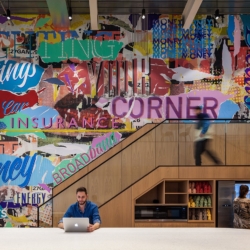To provide the best experiences, we use technologies like cookies to store and/or access device information. Consenting to these technologies will allow us to process data such as browsing behaviour or unique IDs on this site. Not consenting or withdrawing consent, may adversely affect certain features and functions.
The technical storage or access is strictly necessary for the legitimate purpose of enabling the use of a specific service explicitly requested by the subscriber or user, or for the sole purpose of carrying out the transmission of a communication over an electronic communications network.
The technical storage or access is necessary for the legitimate purpose of storing preferences that are not requested by the subscriber or user.
The technical storage or access that is used exclusively for statistical purposes.
The technical storage or access that is used exclusively for anonymous statistical purposes. Without a subpoena, voluntary compliance on the part of your Internet Service Provider, or additional records from a third party, information stored or retrieved for this purpose alone cannot usually be used to identify you.
The technical storage or access is required to create user profiles to send advertising, or to track the user on a website or across several websites for similar marketing purposes.
 The European Union is strengthening its efforts to make its energy systems cleaner and more resilient, reinforcing its global leadership in reducing greenhouse gas emissions, according to a new energy policy review by the International Energy Agency.
The European Union is strengthening its efforts to make its energy systems cleaner and more resilient, reinforcing its global leadership in reducing greenhouse gas emissions, according to a new energy policy review by the International Energy Agency.






 New research suggests that almost half (44 percent) of working carers in England and Wales, equivalent to around 1.6 million people, are struggling to cope with the pressures of balancing their work and caring responsibilities – and that a quarter (24 percent) have considered giving up their job entirely. These are the findings in a newly published report, titled “Supporting working carers: How employers and employees can benefit”, from the
New research suggests that almost half (44 percent) of working carers in England and Wales, equivalent to around 1.6 million people, are struggling to cope with the pressures of balancing their work and caring responsibilities – and that a quarter (24 percent) have considered giving up their job entirely. These are the findings in a newly published report, titled “Supporting working carers: How employers and employees can benefit”, from the 












 Over a third (36 percent) of UK businesses believe that implementing new health and safety measures in accordance with the Government’s recently published guidelines are the biggest challenge they face as lockdown eases and they attempt to return to the workplace, according to new research conducted by the UK law firm,
Over a third (36 percent) of UK businesses believe that implementing new health and safety measures in accordance with the Government’s recently published guidelines are the biggest challenge they face as lockdown eases and they attempt to return to the workplace, according to new research conducted by the UK law firm, 
 The easing of lockdown restrictions and a return to offices is raising the stress levels of over a quarter of UK tech professionals (26 percent) at a time when over 1 in 3 (36 percent) report that their mental health has deteriorated during Covid-19, according to a new
The easing of lockdown restrictions and a return to offices is raising the stress levels of over a quarter of UK tech professionals (26 percent) at a time when over 1 in 3 (36 percent) report that their mental health has deteriorated during Covid-19, according to a new 









June 9, 2020
A thank you for the bitter knowledge offered by the lockdown
by Adam Burtt-Jones • Comment, Flexible working, Workplace design